- Home
- History
- Community
- Organizations
- Chinese Consolidated Benevolent Association
- Victoria Chinese Canadian Veterans Association
- Chinese Public School
- Clan Associations
- County Assocations
- Dialect Assocations
- Friendship Associations
- Political Organizations
- Recreational Associations
- Religious Organizations
- Women's Associations
- Other Organizations
- People
- Resources
- Contact
Chan Dun (1877-1957)
A Victoria Businessman, Chinese Revolutionary, and Canadian Patriot
Chan Dun and his family operated the Panama Cafe at 1407-1409 Government Street. The Panama Cafe offered affordable meals from 1910 to about 1967 (City of Victoria Archives, M01349).
Chan Dun travelled from China to Victoria as a youth. He became a successful businessman, operating the Panama Cafe on Government Street for almost fifty years before he died in 1957 at age 80. Chan Dun supported the Nationalist cause in China and helped found a flying school in Victoria to train pilots to fight in China. During the Second World War, four of his sons volunteered overseas to support the Allied war effort.
Interior of the Panama Cafe, ca. 1917. Chan Dun is standing behind the counter (City of Victoria Archives, M00274).
Chan Dun came to Victoria in 1893 from Toysan, when he was sixteen. A decade later, he got into business by investing as a partner in a grocery store with a relative. In 1902, he started operating a series of cafes with partners. These restaurants catered to working class white Victorians and were located near Broad and Johnson Streets. Chan Dun founded the Panama Cafe in 1917 at 536 Johnson Street. It was below the Panama Hotel, a local brothel. Because of a lack of customers at the Johnson Street location, the Panama Cafe moved to its last location at 1407 Government Street in 1930. This building was formerly the Empress Theatre where Chinese operas had been staged, lasting up to four hours. During these performances, vendors sold tea, pastries, candy and peanuts. Chan Dun’s friends from Chinatown thought that moving to a larger building during the Depression was not a good idea, but the restaurant continued to operate on Government Street for over thirty more years. The Panama was a family business as Chan Dun’s wife Koo Ching Lim (1891-1980) and their twelve children (four daughters and eight sons), worked there. This restaurant finally closed in 1967, after fifty years of serving western food in Victoria.
Chan Dun was a founder of the Victoria Chinese Aviation School to support the Nationalist revolution in China. Edith Lee, Chan Dun’s sister-in-law, stands in front of the plane in the Lansdowne Airfield in the early 1920s. Chan Dun’s children are on the airplane and standing in front of Mrs. Lee (City of Victoria Archives, M06952).
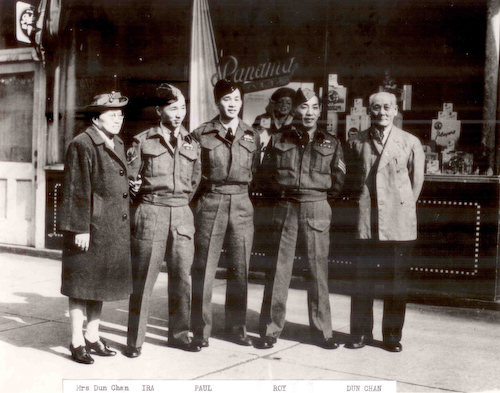
Standing in front of the Panama Cafe are Koo Ching Lim (left) and her husband Chan Dun (right) with three of their four sons who served in the Second World War, from left: Ira, Paul, and Roy (Photo courtesy of Anthony Chan).
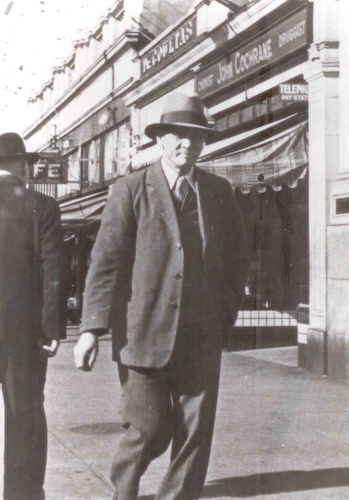
Chan Dun walking on Government Street (Photo courtesy of Anthony Chan).
Chan Dun supported the efforts of the Kuomintang (KMT, or the Chinese Nationalist League in Canada) under Sun Yat-sen to create an elected Chinese government. With another member of the Chinese Nationalist League, Lee Quong Yee, Chan Dun formed the Victoria Chinese Aviation School around 1920 to train pilots for revolutionary fights in China. A First World War pilot, Lieutenant Harry Brown, had already established a flying school at the Lansdowne airfield and he taught the Chinese students. The flying school ended on 24 February 1923, when Hip Quong crashed its training airplane near Esquimalt Harbour, himself emerging from the accident relatively unscathed.
Chan Dun’s family was very musical. In the 1930s, his sons worked in the Panama Cafe during the day and played in a band in the evenings. By 1938, they were part of a popular swing band called the Celestial Gents, performing at functions, dance halls and restaurants in Victoria and Vancouver.
During the Second World War, four of Chan Dun and Koo Ching Lim’s sons — Herby, Ira, Roy, and Paul — enlisted to fight overseas. Sergeant Roy Chan was one of thirteen Chinese Canadian soldiers trained for a secret Borneo mission called Operation Oblivion. Only four of these soldiers, including Roy, were deployed behind enemy lines in Borneo. Douglas Jung and Roy Mah were also trained as part of this operation, but were not deployed to Borneo. Of the other sons, Paul served in India with the army, Herby was in the air force, and Ira was in the army. All four brothers returned to Canada after the war.
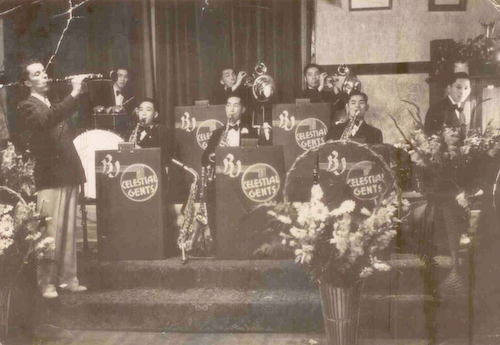
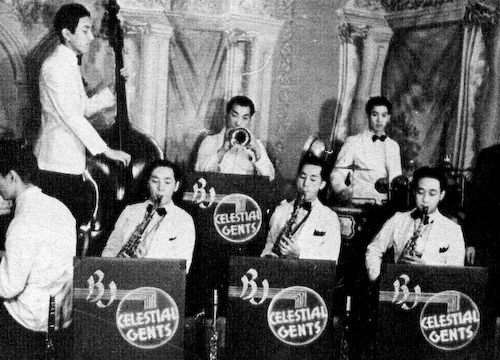
Chan Dun’s sons playing swing music with the Celestial Gents (Photos courtesy of Anthony Chan).
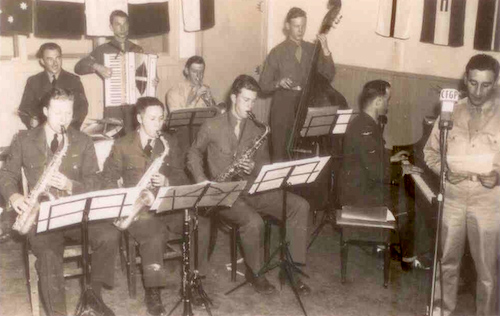
Herby Chan, the fourth son who enlisted, playing the saxophone with a military band (Photo courtesy of Anthony Chan).

Interior of the Panama Cafe, 1945 (Photo courtesy of Anthony Chan).
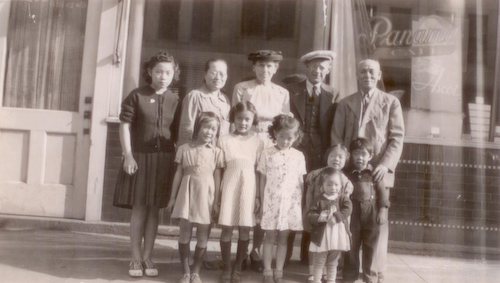
The Chan family in front of the Panama Cafe in 1947. Chan Dun is at the back right (Photo courtesy of Anthony Chan).
Sources
Amos, Robert and Kileasa Wong. Inside Chinatown: Ancient Culture in a New World. Victoria, BC: TouchWood Editions, 2009.
Chan, Anthony B. Gold Mountain: The Chinese in the New World. Vancouver: New Star Books: 1983.
Chan, Anthony. “The Panama,” 1997, Canadian Filmmakers Distribution Centre, http://www.cfmdc.org/node/1043 (accessed 7 September 2012).
Chinese Churches. “1940 to 1949 (the War and Post War Years at the Chinese Presbyterian Church, Victoria, B.C. Canada),” http://www.chinesechurches.org/archives/1940-1949/index.html (accessed 7 September 2012).
Lai, David Chuenyan. Chinese Community Leadership: Case Study of Victoria in Canada. Singapore: World Scientific Publishing Co., 2010.
Lister, Kan Chen. “The Celestial Gents, 1937-1941,” Ginger Post, 1 September 2009, http://gingerpost.com/?p=497 (accessed 7 September 2012).
Veterans Affairs Canada, “Heroes Remember — Canadian Chinese Veterans,”
“Roy Chan,” http://veterans.gc.ca/eng/collections/hr_cdnchinese/profile/chanr;
“Paul Chan,” http://veterans.gc.ca/eng/collections/hr_cdnchinese/profile/chanp (accessed 7 September 2012).
Further Reading
Shancheung, Chen. “50c Special at the Panama.” The Asianadian 1, 1979: 6-8.
Brown, Jim. “When Victoria had a Chinese Flying School.” Times Colonist, 13 January 2002.

